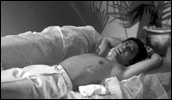Mishima: A Life in Four Chapters
- Year
- 1985
- Original title
- Mishima: A Life in Four Chapters
- Director
- Cast
- Running time
- 120 minutes
- Published
- 10 November 2009



by Roger Macy
Is Paul Schrader's Mishima a Japanese film? The question matters for this website, as it has rightly defined itself as devoted exclusively to Japanese film. But it matters more broadly for a number of reasons crucial to the discussion of film as art, as well as film as property.
Paul Schrader is not Japanese and has not been a Japanese resident except whilst making the film, even though his sister-in-law, Chieko Schrader, both wrote the Japanese dialogue and directed the acting on set. The nationality of the director, although important, and apparently a matter of life or death to some far-right groups, is not everything. Oshima's Merry Christmas, Mr. Lawrence is generally considered British, and Max, Mon Amour French, despite the Japanese nationality of the director. But the outstanding reason to disqualify Mishima is that it has never been exhibited in Japan, despite being made way back in 1985.
Before I delve deeper into the order of battle, I need to give the real reasons why the question matters at all. The film is outstanding in just about every respect and, for readers new to the subject, it concerns a writer of international renown who was Japan's best-selling author and has hardly gone into eclipse since, with repeated translations of his novels and stagings of his plays. The film is striking, inventive, exciting, and beautiful, both visually and musically. It combines a formal inventiveness and overt fabrication, with a forward momentum to a unifying conclusion. It is a composed film, exhilarating and thought-provoking. Schrader's Mishima has also been a highly influential film, both internationally and even within Japan, where it can still only be seen on imported videos.
Its claims to Japaneseness are also multiple and potent. The dialogue is completely Japanese, penned not just by the native-born Japanese Chieko Schrader but, more importantly, from extensive quotations from the literary work of Yukio Mishima. The actors were exclusively Japanese, as were most of the crew. What is more, a substantial amount of the finance was Japanese although, bizarrely, the Toho studio and their partners have persistently denied that they sunk $2 million dollars into a film with inbuilt marketing potential.
So, why has it not been distributed in Japan? It has certainly never been banned by any censor. Curiously, the one censorship regime that would have definitely banned it would have been that of the American occupation (Allied occupation, I would have formally been obliged to call it at the time). Mishima: A Life in Four Chapters would have offended post-war, democratising sensibilities as it would have been perceived as promoting 'feudal' attitudes, sympathetically portraying the bushido code of the samurai and the violent overthrow of democratic governments. But none of these were the reasons behind the Japanese objections to Paul Schrader's film, as these aspects of the film come from the sympathetic writings of Mishima himself. Although one would be hard pressed to name any individual who has come out and said that they are opposed to its distribution in Japan, the objections to the film come from a highly-audible right-wing fringe who themselves share Mishima's declared sentiments but fear (because they have never seen the film) that Schrader's Mishima relates these notions, too personally, to aspects of Yukio Mishima, the man, and worse, might be insufficiently coy about Mishima's sexuality.
The rightist groups - who use loudspeaker trucks at intimidating volume to espouse racially bound paranoia at targets who are often, simultaneously, the recipients of anonymous death threats - were reinforced in their fear of alternate expression when Mishima's widow fell out with the film-makers. The essential subject of Schrader's film, the relationship of Mishima's writing to the real drama of Mishima's last day, focused too much for Madame Mishima on her husband's death and sexuality, and not enough on his prestige as a writer. What followed was one of the great historic clashes between the rights of a film's auteur and of others. In this case, the auteur won completely, ironically with the backing of the American laws that have so often been deployed by studios against putative auteurs. The cost is that there has still been no distribution in the country of origin.
These points are all told much better, first hand, and in much more detail on the DVDs themselves. Two well-packed disks make up Criterion's lavishly produced presentation. The extras on many DVDs on the market are empty gestures - they are simply there to make you, the customer, feel valued. But many a dire commentary is surely packed with the hope that we, the viewers, have the sense to watch the film, and only the film, as the director intended. This is not remotely the case with most Criterion issues and least of all with this double volume. Besides the 120-minute movie on the first disk, there's an optional voice-over commentary by Paul Schrader and producer Alan Poul, but please don't even think of short-cutting to this if you haven't seen the film recently. The 'director's cut' is not radically different from the original release, just restores a cut scene with Chishu Ryu, and digitally redyes a few skies into the originally conceived, austerely saturated, bi-polar colour schemes of art designer Eiko Ishioka. But nothing should get in the way of the visual conception of the film except Philip Glass' intoxicatingly minimalist score. Schrader's commentary itself describes the intimate and integrated way the score was married to the construction of the film. A peculiarity of the rights on this film meant that Glass could reuse large elements of his music elsewhere, but here is the original.
On the second disk are contributions from Glass, cinematographer John Bailey, producer Tom Luddy, art designer Eiko Ishioka, and writer and co-director Chieko Schrader. Each is informative and adds to the appreciation of others' contributions. Concentrating more on Yukio Mishima the historic person are contributions from his biographer John Nathan, a French TV interview with Mishima himself (important for capturing an idea of his reputation during his life), and an hour-long BBC documentary, called The Strange Case of Yukio Mishima. I would recommend ending with a poetic reunification of Mishima the man and writer by a friend of Mishima, who will need no introduction to Japanese film enthusiasts, Donald Richie.
The pack also comes with a 56-page booklet, with stunning production stills, an essay entitled Pen and Sword by Kevin Jackson, and an account of the tortured history of the film's non-distribution in Japan.
This is a long way down a review to get to mention the towering performance in the central role of Mishima by the recently departed Ken Ogata. The passages telling of Mishima's own accumulated past, often matched to voice-overs of Mishima's more autobiographical writing, are filmed in black-and-white, so we only see Ogata in colour in those passages which progress the narrative of Mishima's final day. The voice-over narratives are also by Ogata - the other major change on the re-release. A star of Japanese films, he produced here what is arguably the performance of his life. Schrader relates on his commentary how he was after his lead's bringing out the aristocratic in his Mishima. Comparing the real historical Mishima with his fictional counterpart on the DVD, it looks to me as if Ogata considerably overshot on this trait. After all, Mishima himself played a number of film roles, as this and other websites will confirm, and he generally was cast, with very modest success, as a young thug bereft of class. But I accept that this was the right direction for the portrayal to err. Any lack of nobility of manner in the film's Mishima would have risked coarsening into parodying the pointed comparisons between Mishima's own fictional creations of character, and the role he ultimately prepared for himself. A wide range of the acting talent that was available in 1980s Japan is visible in the fictional episodes of Mishima's writing, played out in highly stylised studio sets. The physical impossibility of each set creates a highly memorable acting space. In the opening episode, The Golden Pavilion, previously treated in a full-length film, Conflagration (Enjo), by Kon Ichikawa, Schrader was particularly successful at conveying the essence of Mishima's story.
Even if you have had the opportunity to see this film restored in its theatrical run, I would highly recommend enriching the experience with an exploration of this DVD set. For anyone reading this from Japan, I should just point out that English subtitles to the film can be switched off, but there are no Japanese subtitles available for the extra features.
But will the question of the Japaneseness of Schrader's Mishima ever be settled? Presumably, as you buy your copy of the DVD, and moneys pass around the globe, the heirs to Toho, with one eye closed, will try not to smile. Very few films in Japan's history have had their distribution completely blocked - compromise is a much-valued quality. The one example I can think of - Fumio Kamei's The Japanese Tragedy - was caught by a rapid reverse course in occupation policy at the outset of the Cold War. Although it might have been tarred as 'un-Japanese' by a premature anti-communist at the time, that would hardly be the same thing as not being Japanese, unless you have a very loaded view of Japaneseness.
To the question of Mishima: A Life in Four Chapters as a Japanese film, an objection would be that the filmmakers themselves have never claimed it as Japanese. 'Irrelevant and inadmissible,' I hear my walk-on judge declare, 'If the court had to examine such absence of evidence, it would have to hear tens of thousands of other cases where an auteur had not explicitly claimed nationality for a work of art. Perception', she continues,' is the entire issue, and I rule as admissible, if inconclusive, the fact that American distributors at the time regarded the film as Japanese.'
The other major aspect which speaks of a work of art's identity revolves around the domicile of its critical life. Given the lack of distribution in Japan, it should come as no surprise if there is little criticism to find there. However, for all I know, there may be more than in the west, where there is less than you would expect. For intellectual criticism, the barrier is that you would need to wade out a long way before you could find waters in which to swim that had not already been covered himself by Schrader, the critic-cum-writer-cum-director, that do not just ploddingly tell what Schrader has overtly shown. It's notable that, outside of 'making of' pieces, and a few contemporary reviews, the criticism of the film that there is comes from the disciplines of music and literature. Of star-oriented film-chat pieces there was hardly any in the west. The highly-experienced actors had no western name-recognition, there was no young actress star whose exoticism could be exploited. Cast members, for whatever reason, seem not to have given any interviews for the western press.
To my opening question, it's time for a summing up. Each query on the Japaneseness of Mishima has a good answer. A series of questions, each adequately answered, should not, logically, increase doubt, except perhaps before a jury needing to prove beyond all reasonable doubt. Why should Japaneseness require such a proof?
So, away with the lawyers, and bring on the art film par excellence. The extraordinary position of the funding, discussed on the extra features of the DVD, that neither party were looking for a commercial return, presented Schrader with a sense of both liberation and responsibility: he had no excuse for the film to be judged as anything other than a work of art.
Quoting George Kouvaros, in his recent biography of Paul Schrader, the film "allows him to capture something central to Mishima's life: not only the distance between art and the thing it approximates, but also the desire to overcome the distance through an act of self-creation. Instead of simply telling the story of Mishima's life, Schrader's film approximates a form that embodies its contradictions. The relationship between the film and its subject is not simply imitative but also performative: it is defined by an explicit exchange between the body of the film and the body it seeks to represent."
You may well know what Yukio Mishima did on his last day, but this review has not told you. Although many of the extra features on these disks centre around this conundrum and quote extensively from the film, the distribution history of Schrader's Mishima, situated away from commercial promotion, means that you have a fair chance of seeing the movie fresh, unpolluted by any trailer. If you can watch the film first, without further direction or commentary, you have the chance to experience a unified work in real time, taking it into your memory, where it will remain and enrichen, as you savour and examine the controversies on this highly satisfying Criterion production.